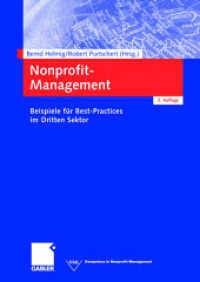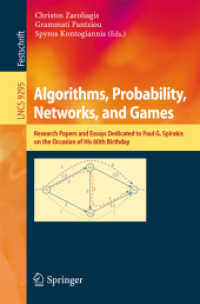- ホーム
- > 洋書
- > 英文書
- > Nature / Ecology
基本説明
It establishes a connection between agriculture and sanitation - the missing link in current discussions on resource recovery.
Full Description
In most developing countries wastewater treatment systems are hardly functioning or have a very low coverage, resulting in large scale water pollution and the use of very poor quality water for crop irrigation especially in the vicinity of urban centres. This can create significant risks to public health, particularly where crops are eaten raw.
Wastewater Irrigation and Health approaches this serious problem from a practical and realistic perspective, addressing the issues of health risk assessment and reduction in developing country settings. The book therefore complements other books on the topic of wastewater which focus on high-end treatment options and the use of treated wastewater. This book moves the debate forward by covering also the common reality of untreated wastewater, greywater and excreta use. It presents the state-of-the-art on quantitative risk assessment and low-cost options for health risk reduction, from treatment to on-farm and off-farm measures, in support of the multiple barrier approach of the 2006 guidelines for safe wastewater irrigation published by the World Health Organization. The 38 authors and co-authors are international key experts in the field of wastewater irrigation representing a mix of agronomists, engineers, social scientists and public health experts from Africa, Asia, Europe, North America and Australia. The chapters highlight experiences across the developing world with reference to various case studies from sub-Saharan Africa, Asia, Mexico and the Middle East. The book also addresses options for resource recovery and wastewater governance, thus clearly establishes a connection between agriculture, health and sanitation, which is often the missing link in the current discussion on 'making wastewater an asset'.
Contents
Preface
Foreword
List of Acronyms and Abbreviations
Part I: Setting the Stage
1: Wastewater, Sludge and Excreta Use in Developing Countries: An Overview
2: Assessing and Mitigating Wastewater Related Health Risks in Low-Income Countries: An Introduction
Part II: Risks and Risk Assessment
3: Risk Analysis and Epidemiology: The 2006 WHO Guidelines for the Safe Use of Wastewater in Agriculture
4: Approaches to Evaluate and Develop Health Risk-Based Standards Using Available Data
5: Tools for Risk Analysis: Updating the 2006 WHO Guidelines
6: Non-Pathogenic Tradeoffs of Wastewater Irrigation
7: Risk Analysis Integrating Livelihood and Economic Impacts of Wastewater Irrigation on Health
Part III: Minimizing Health Risks
8: Wastewater Treatment for Pathogen Removal and Nutrient Conservation: Suitable Systems for Use in Developing Countries
9: Low-Cost Options for Pathogen Reduction and Nutrient Recovery from Faecal Sludge
10: Farm-Based Measures for Reducing Microbiological Health Risks for Consumers from Informal Wastewater-Irrigated Agriculture
11: Farm-Based Measures for Reducing Human and Environmental Health Risks from Chemical Constituents in Wastewater
12: Applying the Multiple-Barrier Approach for Microbial Risk Reduction in the Post-Harvest Sector of Wastewater Irrigated Vegetables
13: Cost Effectiveness Analysis of Interventions for Diarrhoea Disease Reduction among Consumers of Wastewater-Irrigated Lettuce in Ghana
Part IV: Wastewater Governance and Adoption of Risk Reduction Options
14: Challenging Conventional Approaches to Wastewater Use in Agriculture
15: Designing Reuse-Oriented Sanitation Infrastructure: The Design for Service Planning Approach
16: Facilitating the Adoption of Food Safety Interventions in the Street Food Sector and on Farm
17: Harnessing Farmers' Knowledge and Perceptions for Health Risk Reduction in Wastewater Irrigated Agriculture
18: Multi-Stakeholder Processes for Managing Wastewater Use in Agriculture
Part V: Conclusions and Outlook
19: Wastewater Irrigation and Health: Challenges and Outlook for Mitigating Risks in Low-Income Countries








